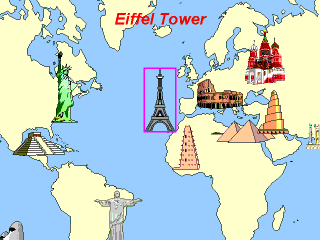
 |
Learn geography with a free interactive map that teaches the locations of the major cultural monuments of the world. |
 |
World Monuments Map PuzzlePower, Pride and Devotion |
|
|
More
Map Puzzles!
Find more FREE Educational Software
at the
|
 Geography
is the study of places, including the people who live or have lived
there. People have built monuments because something mattered, and to
show that it mattered. They became a major part of where they were
built and have often come to stand for that place. Geography
is the study of places, including the people who live or have lived
there. People have built monuments because something mattered, and to
show that it mattered. They became a major part of where they were
built and have often come to stand for that place.The heart of geography, and even the source of its name is the map—a picture of the world which organizes our understanding of places. Geography is not just the locations of political boundaries or the physical landscape, but also the cultural landscape. Manipulating a map, assembling it, is the best way to learn where things are, and how near or far they are to each other. The map is a framework that brings other knowledge together and makes the world understandable. Geography is spatial, why not study it spatially? Monuments are meant to last; to be there for future generations. The majority of the monuments are religious, but often not the religion of the people who live there now modern Egyptians are mostly Muslims, not believers in Osiris or Ra. We are not even certain of the religious beliefs of the builders of Stonehenge or the Easter Island statues, but we know their beliefs were important to them, for them to have built what they did. The basic reason for monuments, and our response to them, may be that we want some part of our culture and our lives to be permanent and remembered. But permanent is a relative term the pyramids are the only one of the seven wonder of the ancient world that still exist. Shelley captured this in his poem Ozymandias: "My name is Ozymandias, king of
kings:
Free! Play World Monuments Map Puzzle online
|
||
 |
You might also be interested
in: Interactive Map of Asia |
|
|